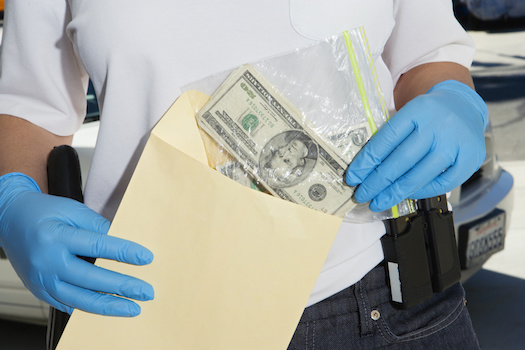What is it? How Does it Work?
Asset forfeiture cases can be civil, criminal, or both.

In the case of a criminal forfeiture case, the government will, typically, include in an indictment (usually in connection with a drug, money laundering, wire fraud, securities fraud, or tax evasion charge) an allegation that the government is entitled to certain items of property or certain sums of cash. Often the items that the government wishes to have forfeited is cash that it believes represents proceeds of the sale of illegal drugs. Sometimes it is the cash in the pocket, car, or home of someone arrested on drug charges needs to prove that the money or property is “clean”, that is not connected to criminal activity, in order to keep it.
Sometimes, however, (usually in the context of a routine traffic stop) law enforcement officers will stumble onto cash in the possession of an occupant of the vehicle. In these cases, the law enforcement officer will take possession of the cash, report it to some federal agency like the DEA or the FBI, and civil asset forfeiture proceedings will be initiated. In this case, a notice will be mailed to the person who possessed the asset, and a clock will begin to run whereby that person must contest the forfeiture, or forever lose his right to try to recover it.
______________
Free Initial Consultation
On Cases over $25,000.00
Call Now. (512) 693-9529
______________
In many cases, the federal government will both include a forfeiture count in a criminal indictment and initiate civil proceedings for forfeiture of the same assets. They do this for a variety of reasons, the most important of which is that there are procedural advantages and disadvantages to each method of forfeiture, and by doing both, they get the best of both worlds, and the defendant/respondent gets the worst!
The burden of proof is technically on the government to prove certain things, but because the law recognizes that certain presumptions can be made about the nature of certain assets (like large amounts of cash in the possession of someone who hasn’t had documented work in a couple of years), the defendant usually has to prove that the asset is legitimate and does not represent the proceeds of illegal activity.
Sometimes in a contested or questionable case, the government, to save the time and expense of going through a full-blown trial to prove that the money is really illegal, will agree to settle the case for only a portion of the proceeds in question, and return the rest to the owner.
The procedures, whether the case is civil or criminal, are complicated, and should be handled by an attorney who is experienced in handling such matters. If the matter is not handled in a timely fashion, or if some technical requirement is not met, a person could forever lose the right to try to recover legitimate money or property.
Very frequently, even when the law enforcement officers who take the money are clearly informed by the owner of the money that the money is legitimate, they will still take the money in hopes that you will either do nothing about it, in which case they get to keep it by default; that you will try to handle it yourself, missing a deadline or not meeting the requirements for your claim required by the complicated statutes. Too many people allow this unscrupulous practice to continue without challenge. Some are just so disillusioned by the new realization that this sort of thing can happen in the first place, that they feel helpless, and just let it go. Many unscrupulous law enforcement officers will even try to intimidate the owner of the money into believing that something bad will happen to them if they try to claim their money. Some law enforcement officers will even try to keep the money without giving a proper receipt for it. If any of this has happened to you, do not sit idly by and allow it to happen to you. You need an experienced and aggressive advocate.
If you would like to discuss your case with me, please call or email me. Just click on the “Contact Us” link on the top of the page and I would be glad to talk to you about your matter. I do provide FREE INITIAL CONSULTATIONS for cases involving over $25,000.00. During the initial consultation, I can explain the process and quote a fee that reflects the amount of work that will likely be required, but the fee can be as little as $8,500.00 in some cases.
Call to talk with an experienced federal asset forfeiture attorney today. If you have already received your DEA-8 form, the clock is ticking. Call (512) 693-9LAW or click on the “Contact Us” link here or at the top of the page.
by Chad Van Cleave
______________
Free Initial Consultation
On Cases over $25,000.00
Call Now. (512) 693-9529
______________

